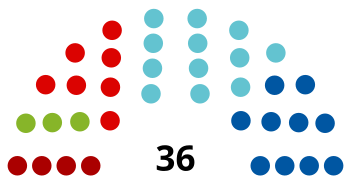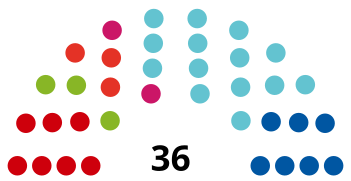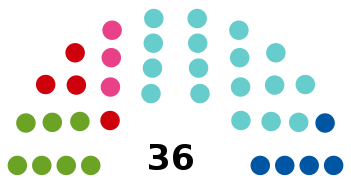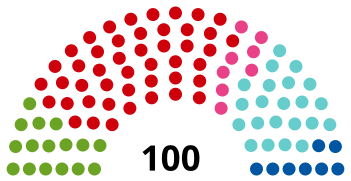
Austria is a predominantly mountainous country in Central Europe, approximately between Germany, Italy and Hungary. It has a total area of 83,871 square kilometres (32,383 sq mi), about 2.031706 times the size of Switzerland.

Austria is a federal republic consisting of nine federal states. The European Commission calls them provinces. Austrian federal states can pass laws that stay within the limits of the constitution, and each federal state has representatives in the main Austrian parliament.

Cisleithania, officially The Kingdoms and Lands Represented in the Imperial Council, was the northern and western part of Austria-Hungary, the Dual Monarchy created in the Compromise of 1867—as distinguished from Transleithania. This name for the region was a common, but unofficial one.

The Greens – The Green Alternative is a green political party in Austria.

A Landtag is generally the legislative assembly or parliament of a federated state or other subnational self-governing entity in German-speaking nations. It is usually a unicameral assembly exercising legislative competence in non-federal matters.

Ostmark was a name that referred historically to the Margraviate of Austria, a medieval frontier march. It was also used in Nazi propaganda from 1938 to 1942 to refer to the formerly independent Federal State of Austria after the Anschluss with Nazi Germany. From the Anschluss until 1939, the official name used was Land Österreich.

The Republic of German-Austria was an unrecognised state that was created following World War I as an initial rump state for areas with a predominantly German-speaking and ethnic German population within what had been the Austro-Hungarian Empire, with plans for eventual unification with Germany. The territories covered an area of 118,311 km2 (45,680 sq mi), with 10.4 million inhabitants.
The Austrian Landesliga is the fourth tier of professional football in Austria. It is divided into nine conferences — one for each Austrian state:

The following outline is provided as an overview of and topical guide to Austria:

The States of the Weimar Republic were the first-level administrative divisions and constituent states of the German Reich during the Weimar Republic era. The states were established in 1918 following the German Revolution upon the conclusion of World War I, and based on the 22 constituent states of the German Empire that abolished their local monarchies. The new states continued as republics alongside the three pre-existing republican city-states within the new Weimar Republic, adopting the titles Freistaat or Volksstaat.

JUNOS – Young liberal NEOS is the youth wing of Austrian liberal NEOS party, and a full member of liberal youth organizations International Federation of Liberal Youth and European Liberal Youth.

NEOS – The New Austria and Liberal Forum is a liberal political party in Austria. It was founded as NEOS – The New Austria in 2012. In 2014, NEOS merged with Liberal Forum and adopted its current name.

Legislative elections were held in Austria on 15 October 2017 to elect the 26th National Council, the lower house of Austria's bicameral parliament. The snap election was called when the coalition government between the Social Democratic Party of Austria (SPÖ) and Austrian People's Party (ÖVP) was dissolved in May by the latter party's new leader Sebastian Kurz.

Legislative elections were held in Austria on 29 September 2019 to elect the 27th National Council, the lower house of Austria's bicameral parliament. The snap election was called in the wake of the Ibiza affair in May, which caused the resignation of Vice Chancellor Heinz-Christian Strache and the collapse of the governing coalition of the Austrian People's Party (ÖVP) and Freedom Party of Austria (FPÖ). The government subsequently lost a motion of no confidence in parliament, before ÖVP Chancellor Sebastian Kurz was replaced by non-partisan Brigitte Bierlein on an interim basis.

The 2018 Salzburg state election was held on 22 April 2018 to elect the members of the Landtag of Salzburg.

The 2015 Burgenland state election was held on 31 May 2015 to elect the members of the 21st Landtag of Burgenland.

The 2019 Vorarlberg state election was held on 13 October 2019 to elect the members of the Landtag of Vorarlberg.

The 2014 Vorarlberg state election was held on 21 September 2014 to elect the members of the Landtag of Vorarlberg.

The 2022 Tyrolean state election was held on 25 September 2022 to elect the members of the Landtag of Tyrol. Incumbent Governor Günther Platter of the Austrian People's Party (ÖVP) retired at the election; Anton Mattle was the party's lead candidate.
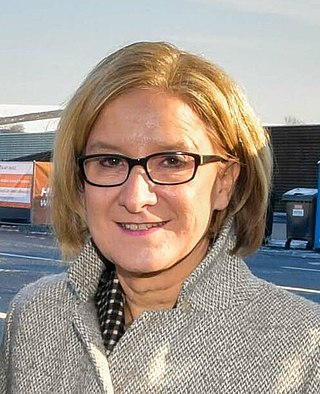
The 2023 Lower Austrian state election was held on 29 January 2023 to elect the members of the Landtag of Lower Austria.







